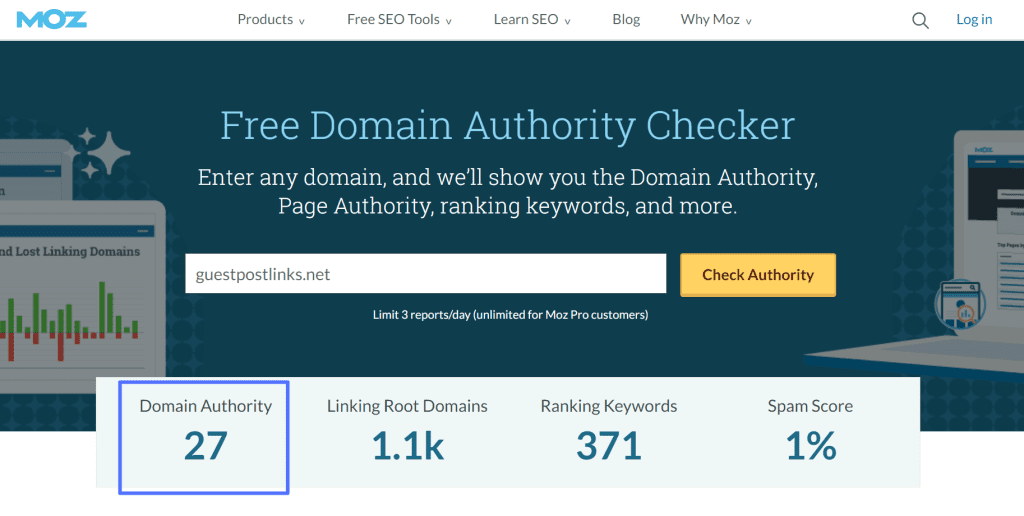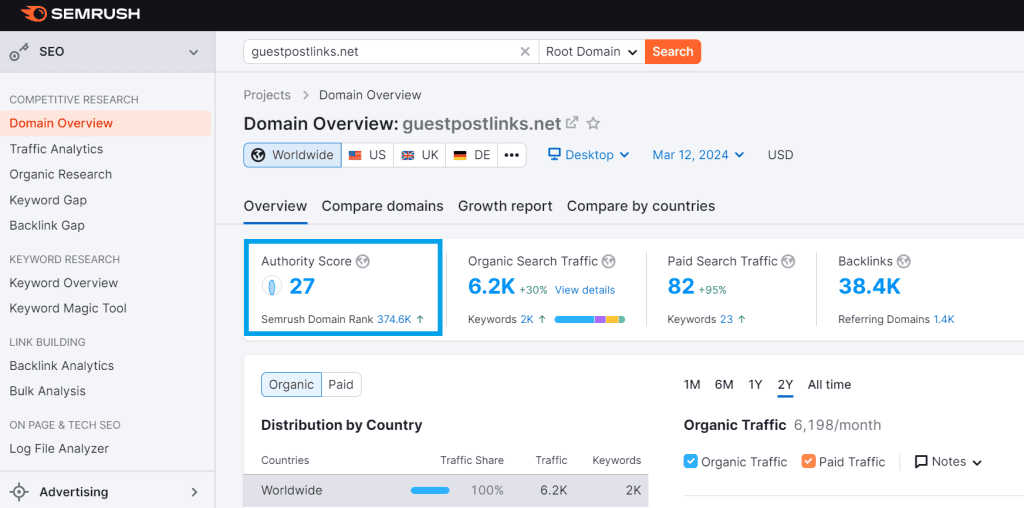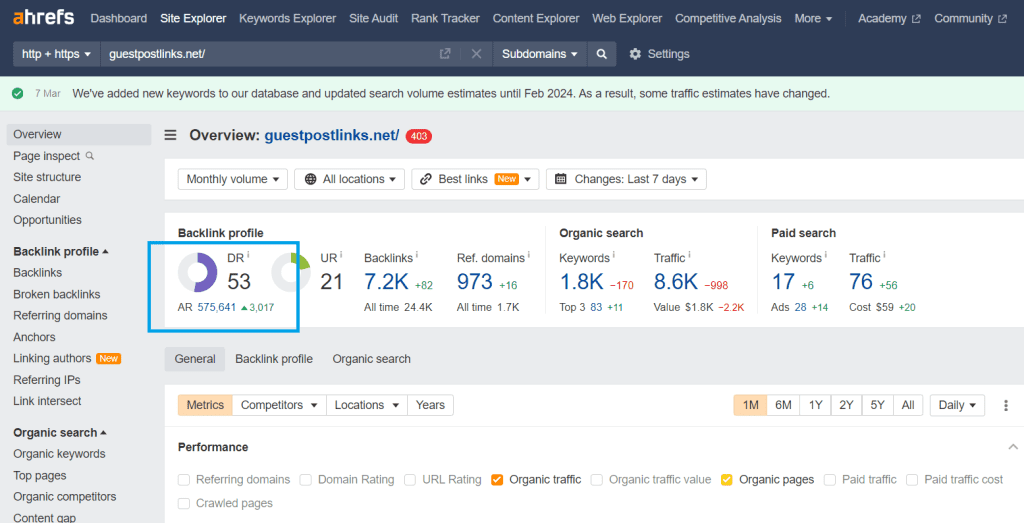Ever notice how some websites always pop up first when you search for something? That’s often because they have something called ‘Website Authority’. It’s like a badge of trust from the internet, showing that a website is good at what it does and people can rely on it.
In this easy-to-follow post, we’ll talk about what Website Authority really is and why it’s super important. But that’s not all – we’ll also give you some straightforward tips on how to make your own website more powerful and trusted.
Whether you’re starting a brand-new blog or trying to get more people to visit your online shop, these ideas will help you step up your game. Ready to make your website stand out? Let’s get started!
- What is Website Authority?
- Factors Influencing Website Authority
- How is Website Authority Measured?
- 6 Strategies to Build Website Authority
- Examples of Authoritative Websites
- Who decides which sites have authority?
- Why is website authority important for SEO?
- How to increase the website authority?
- 1. Create High-Quality Content
- 2. Keyword Optimization
- 3. Content Freshness
- 4. Build High-Quality Backlinks
- 5. Start Internal Linking
- 6. Mobile Optimization
- 7. Improve Page Loading Speed
- 8. Social Media Presence
- 9. Improve User Experience (UX)
- 10. Secure Your Website
- 11. Schema Markup
- 12. Monitor and Analyze
- 13. Start Guest Blogging
- 14. Be Patient
- Authority Site Model vs Niche Site vs Affiliate Site
- How Do You Know if Your Website Is Authoritative?
- FAQs
What is Website Authority?
Website authority is an SEO (Search Engine Optimization) metric that estimates the relative strength and credibility of a website’s domain or a specific page. While not a direct ranking factor used by search engines like Google, it’s a comprehensive indicator of a site’s ability to rank well in search engine results pages (SERPs).
High website authority signifies a trustworthy, relevant, and valuable resource in the eyes of both users and search engines.
Factors Influencing Website Authority
Several key factors contribute to a website’s authority, including:
- Link Profile: The number and quality of backlinks pointing to a website are among the most significant factors. Links from high-authority, reputable sites contribute more positively to a site’s authority.
- Content Quality: High-quality, relevant, and valuable content attracts more links and engagement, signaling to search engines that the website is a credible source of information.
- Site Age: Generally, older domains may be perceived as more trustworthy than newly registered ones, assuming they maintain a positive reputation over time.
- User Experience (UX): A website that provides a great user experience, including fast load times, mobile-friendliness, and intuitive navigation, can positively influence its authority.
- Social Signals: While the direct impact of social signals (likes, shares, etc.) on SEO is debated, they can indirectly affect website authority by increasing visibility and the potential for backlinks.
How is Website Authority Measured?
Several SEO tools and platforms offer proprietary metrics to gauge website authority, each with its unique calculation method.
The most notable among these are:
- Domain Authority (DA) by Moz: This score predicts how well a website will rank on search engine result pages (SERPs). DA scores range from 1 to 100, with higher scores indicating greater ranking potential.

- Authority Score by Semrush: Semrush’s Authority Score assesses the overall quality and SEO performance of a domain, considering factors like backlink data, website traffic, and organic search data.

- Domain Rating (DR) by Ahrefs: Ahrefs’ DR measures the strength of a website’s backlink profile on a scale from 0 to 100, with higher scores indicating a stronger backlink profile.

These metrics, while not used by search engines in their algorithms, provide valuable insights for marketers and website owners to benchmark their site’s authority against competitors and identify areas for improvement.
6 Strategies to Build Website Authority
Building website authority is akin to constructing a skyscraper. Just as a skyscraper requires a solid foundation, high-quality materials, and meticulous planning, enhancing your website’s authority demands a strategic, multifaceted approach. Here are key strategies to elevate your website’s authority and, consequently, its search engine rankings.
1. Produce High-Quality, Relevant Content
Content is the cornerstone of website authority. High-quality, informative, and engaging content attracts visitors, encourages shares, and earns backlinks, all of which signal to search engines that your website is a valuable resource.
- Target Audience Needs: Understand and address the questions, problems, and interests of your target audience.
- Comprehensive Coverage: Aim for content that provides thorough answers and insights, making your pages the best resource on the topic.
- Original Research and Data: Content that includes unique research, surveys, or analysis can attract high-quality backlinks and citations.
2. Earn High-Quality Backlinks
Backlinks, or links from other websites to yours, are a critical factor in building website authority. Not all backlinks are created equal; links from reputable, high-authority sites have a more significant impact.
- Guest Blogging: Contribute high-quality articles to reputable sites in your industry to gain backlinks.
- Broken Link Building: Identify broken links on other websites and suggest your content as a replacement.
- Skyscraper Technique: Improve upon existing content that has already earned backlinks, then reach out to those linking to the original piece and offer your superior content as an alternative.
3. Optimize On-Page SEO
On-page SEO ensures that your content is easily understandable by search engines and users, improving your site’s visibility and authority.
- Keyword Optimization: Use relevant keywords naturally in your content, titles, and meta descriptions.
- Internal Linking: Use internal links to connect your content, helping search engines understand the structure and hierarchy of your site.
- Mobile-Friendliness: Ensure your site is responsive and provides a good user experience on mobile devices.
4. Improve Technical SEO
The technical health of your website affects its user experience and search engine rankings. A technically optimized site is easier for search engines to crawl and index.
- Site Speed: Optimize images, leverage browser caching, and minimize CSS/JavaScript to improve loading times.
- Secure Sockets Layer (SSL): Use HTTPS to secure your site, a factor that search engines consider.
- Clean Site Structure: Organize your site logically and use a sitemap to help search engines crawl your site more effectively.
5. Leverage Social Media
While social signals are not a direct ranking factor, they can enhance visibility and lead to more backlinks and traffic, indirectly boosting your site’s authority.
- Active Social Presence: Regularly post engaging content on social media platforms where your audience is active.
- Social Sharing Buttons: Make it easy for visitors to share your content on social media, increasing its reach and potential for backlinks.
6. Regular Audits and Updates
Maintaining website authority requires ongoing effort. Regular audits can help identify and rectify issues that might be hindering your site’s performance.
- Content Audits: Update outdated content and improve underperforming pages.
- Backlink Audits: Use tools to monitor your backlink profile and disavow toxic links.
- Technical SEO Audits: Regularly check for and fix technical issues that could affect your site’s search engine visibility.
Building website authority is a long-term endeavor that demands patience, consistency, and a commitment to quality. By implementing these strategies, you can enhance your site’s credibility, improve its search engine rankings, and establish your domain as an authoritative source in your industry.
Examples of Authoritative Websites
Authoritative websites are trusted and respected sources of information that are recognized for their expertise, accuracy, and reliability. They often serve as references for a wide range of topics and are considered go-to resources for users seeking credible information.
Here are some examples of authoritative websites across various domains:
1. Wikipedia
Wikipedia is a collaborative online encyclopedia that covers an extensive range of topics. It is known for its vast information and is often the first stop for general knowledge.
2. PubMed
PubMed is a repository of articles related to biomedical and life sciences. It is widely recognized for its authoritative content and serves as a primary resource for researchers and healthcare professionals.
3. The New York Times
As one of the most reputable newspapers globally, The New York Times is a trusted source for news and in-depth analysis on various topics, from politics to culture.
4. Harvard Business Review
This publication provides authoritative insights into business, management, and leadership. It’s a go-to resource for professionals seeking expert advice.
5. WebMD
WebMD is a trusted source for medical and health-related information. It offers comprehensive information on various health conditions and treatments.
6. National Aeronautics and Space Administration (NASA)
NASA’s website is the go-to source for authoritative information on space exploration, astronomy, and related topics.
7. Stanford Encyclopedia of Philosophy
This online encyclopedia offers authoritative entries on a wide range of philosophical topics, making it a valuable resource for students and researchers.
8. National Geographic
National Geographic is known for its high-quality content on geography, science, and culture. It’s a respected source for information about the world.
9. Financial Times
The Financial Times is a trusted source for authoritative financial news, analysis, and business insights.
10. Smithsonian Institution
The Smithsonian’s website provides authoritative information on history, science, and culture, making it a valuable resource for education and research.
These are just a few examples of authoritative websites that cover a diverse range of subjects and are recognized for their expertise and credibility.
When seeking reliable information, it’s essential to turn to such websites to ensure the accuracy and trustworthiness of the content.
Who decides which sites have authority?
Search engines, primarily Google, decide which sites have authority based on a variety of factors and algorithms. These algorithms assess the quality of content, the number and quality of backlinks pointing to the site, user engagement metrics, and more. Google’s algorithms are constantly evolving to ensure the most reliable and relevant results for users.
Also Check: SEO Glossary Unveiled: 480+ Crucial Terms Every Marketer Should Understand!
Why is website authority important for SEO?
Website authority is a crucial factor in the world of Search Engine Optimization (SEO). It refers to the perceived credibility and trustworthiness of a website in the eyes of search engines like Google. Websites with higher authority are more likely to rank well in search engine results pages (SERPs) and attract organic traffic.
There are several reasons why website authority is important for SEO:
Trust and Credibility
Search engines aim to provide users with the most relevant and trustworthy information. Websites with high authority are seen as more reliable sources of information. When your website has authority, users are more likely to trust its content, which can result in increased user engagement and longer time spent on your site.
Improved Search Engine Rankings
High-authority websites are more likely to rank higher in search engine results. When your website ranks well for relevant keywords, it can attract more organic traffic. This can lead to increased visibility, more clicks, and ultimately more conversions.
Backlink Attraction
Authority often attracts other websites to link to yours. Backlinks from authoritative sources are highly valuable in SEO. They signal to search engines that your content is worth referencing, which can positively impact your rankings. Building a strong backlink profile is a key element of improving website authority.
Content Promotion
Websites with higher authority can more effectively promote their content. When you publish new content, it’s more likely to be indexed quickly and promoted by search engines. This means that your content will reach a wider audience faster, increasing its potential impact.
User Experience
High-authority websites often provide a better user experience. This includes faster page loading times, mobile responsiveness, and secure browsing (via HTTPS). These factors can indirectly influence SEO by reducing bounce rates and improving user engagement.
Competitive Advantage
In competitive industries, website authority can be a game-changer. If your website has higher authority than your competitors, you’re more likely to outrank them in search results and attract their potential customers.
Long-Term Sustainability
Building website authority is a long-term strategy. While it may take time to establish, it also tends to be more sustainable. Once you’ve built a strong authority, it becomes more difficult for competitors to overtake you, providing a lasting SEO advantage.
How to increase the website authority?
To increase your website’s authority, focus on the following strategies:
1. Create High-Quality Content
Create valuable, informative, and well-researched content that addresses the needs and interests of your target audience. Quality content attracts links and encourages visitors to stay longer on your site, which can improve your authority.
2. Keyword Optimization
Conduct keyword research to identify relevant keywords in your niche. Optimize your content with these keywords to improve your site’s visibility in search engine results.
3. Content Freshness
Regularly update and refresh your content to demonstrate that your website provides up-to-date information. This can positively impact your authority, especially in industries where information changes frequently.
4. Build High-Quality Backlinks
Backlinks from reputable and authoritative websites can significantly boost your website’s authority. Focus on creating link-worthy content and engage in ethical link-building practices, such as guest posting, outreach, and collaborations with industry influencers.
5. Start Internal Linking
Utilize internal links to connect related content within your website. This not only enhances the user experience but also distributes authority throughout your site.
6. Mobile Optimization
Ensure that your website is mobile-friendly and provides a seamless user experience on all devices. Google considers mobile-friendliness when ranking websites, which can impact your authority.
7. Improve Page Loading Speed
Fast-loading pages are crucial for user experience and can positively affect your website’s authority. Compress images, use content delivery networks (CDNs), and optimize code to improve loading times.
8. Social Media Presence
Maintain an active and engaging presence on social media platforms. Sharing your content and engaging with your audience can help increase your brand’s authority and drive more traffic to your website.
9. Improve User Experience (UX)
A well-designed and user-friendly website encourages visitors to stay longer and engage with your content. Invest in a clean and intuitive website layout to improve user experience.
10. Secure Your Website
Implement HTTPS to ensure a secure connection, which can improve user trust and search engine rankings. Regularly update your website’s security features to protect against vulnerabilities.
11. Schema Markup
Use schema markup to provide search engines with structured data about your content. This can enhance the appearance of your search results, making your site more appealing to users.
12. Monitor and Analyze
Regularly monitor your website’s performance using tools like Google Analytics and Google Search Console. Analyze user behavior, track rankings, and adjust your strategies accordingly.
13. Start Guest Blogging
Contribute guest posts to authoritative websites in your niche. This can help you establish yourself as an expert and build backlinks to your site.
14. Be Patient
Increasing website authority is a long-term effort. It takes time to earn trust and build a strong online presence, so be patient and persistent in your efforts.
Authority Site Model vs Niche Site vs Affiliate Site
Authority Site Model
An authority site aims to become an industry leader by covering a wide range of topics within a specific niche. It focuses on creating comprehensive, in-depth content and building a strong brand presence. Examples include Wikipedia and WebMD.
Niche Site
Niche sites are specialized websites that target a specific, often narrow, topic or audience. They aim to establish authority within their niche and generate revenue through targeted content and monetization strategies.
Affiliate Site
Affiliate sites primarily focus on promoting products or services through affiliate marketing. They often lack extensive content but leverage product reviews and recommendations to earn commissions from sales.
How Do You Know if Your Website Is Authoritative?
You can gauge your website’s authority by assessing factors like:
Backlink Profile
Analyze the quantity and quality of backlinks pointing to your site. High-quality, relevant backlinks from authoritative sources are a positive sign.
Content Quality
Evaluate the depth, accuracy, and relevance of your content. Authoritative sites provide well-researched and informative content.
User Engagement
Monitor user engagement metrics such as bounce rate, time on site, and social shares. High user engagement indicates trustworthiness.
Search Engine Rankings
If your website consistently ranks well for relevant keywords and phrases, it’s a sign that search engines consider it authoritative.
Online Reputation
Positive reviews, mentions in reputable publications, and a strong social media presence can also indicate authority.
In conclusion, website authority is a critical factor in SEO, and building it requires a combination of high-quality content, backlinks, and user trust. By following best practices and consistently delivering value to your audience, you can increase your website’s authority and improve its search engine rankings.
FAQs
Several factors influence Website Authority, including the quality and relevance of backlinks, the age of the domain, the content quality, user experience, and social signals like shares and mentions on social media.
Yes, you can improve your Website Authority by creating high-quality, informative, and relevant content, obtaining high-quality backlinks from reputable websites, optimizing your website’s technical aspects, and maintaining a strong social media presence.
No, Website Authority (Domain Authority) and Google PageRank are different metrics. PageRank was once used by Google to measure the importance of individual web pages, while Website Authority assesses the overall credibility of an entire website.
Increasing Website Authority is a gradual process and can take several months or even years, depending on various factors. Consistent effort in content creation, link building, and SEO optimization is key to improving authority over time.
Yes, a website’s authority can decrease if it loses high-quality backlinks, experiences a decline in content quality, or faces penalties from search engines due to spammy practices.
No, Website Authority is just one of many factors that influence search engine rankings. Search engines use a combination of algorithms and hundreds of other factors to determine how websites rank in search results.
Yes, engaging in manipulative practices to artificially inflate Website Authority, such as buying low-quality backlinks, can lead to penalties from search engines, which can negatively impact a website’s rankings.
Yes, Website Authority is relevant for all types of websites, including blogs, e-commerce sites, news sites, and informational websites. It’s a metric that helps assess a website’s credibility regardless of its purpose.
